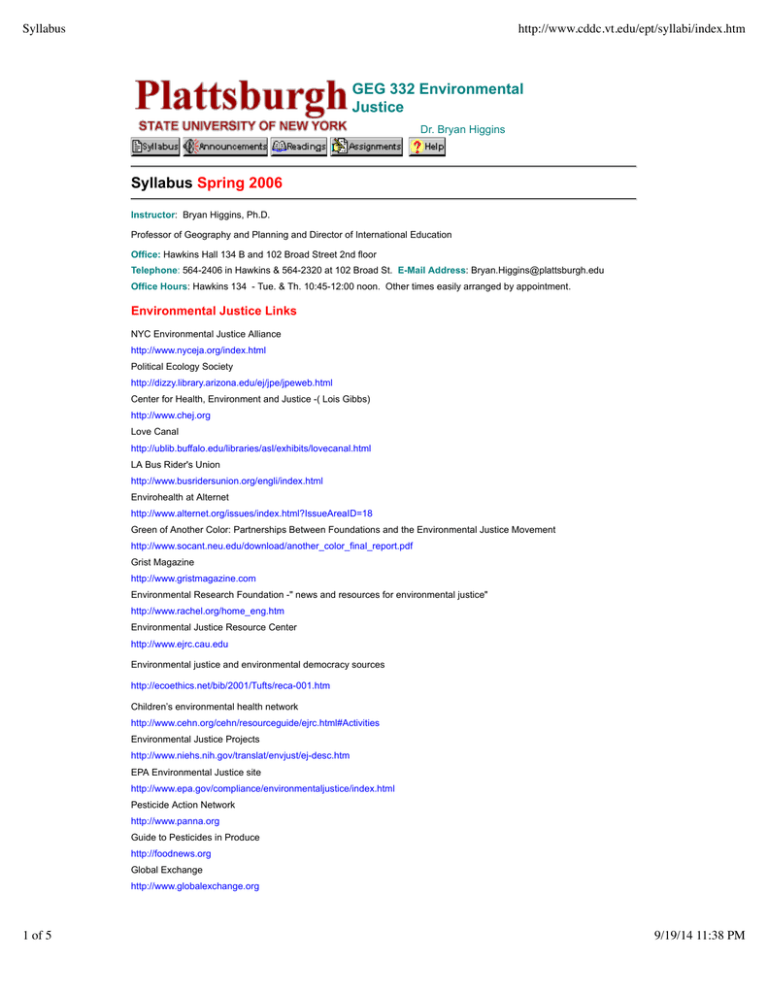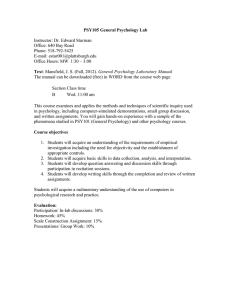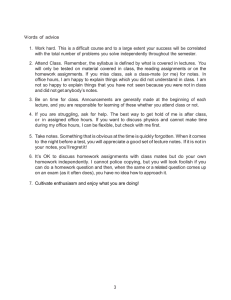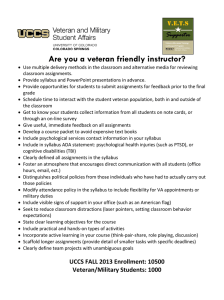GEG 332 Environmental Justice Syllabus Spring 2006
advertisement

Syllabus http://www.cddc.vt.edu/ept/syllabi/index.htm GEG 332 Environmental Justice Dr. Bryan Higgins Syllabus Spring 2006 Instructor: Bryan Higgins, Ph.D. Professor of Geography and Planning and Director of International Education Office: Hawkins Hall 134 B and 102 Broad Street 2nd floor Telephone: 564-2406 in Hawkins & 564-2320 at 102 Broad St. E-Mail Address: Bryan.Higgins@plattsburgh.edu Office Hours: Hawkins 134 - Tue. & Th. 10:45-12:00 noon. Other times easily arranged by appointment. Environmental Justice Links NYC Environmental Justice Alliance http://www.nyceja.org/index.html Political Ecology Society http://dizzy.library.arizona.edu/ej/jpe/jpeweb.html Center for Health, Environment and Justice -( Lois Gibbs) http://www.chej.org Love Canal http://ublib.buffalo.edu/libraries/asl/exhibits/lovecanal.html LA Bus Rider's Union http://www.busridersunion.org/engli/index.html Envirohealth at Alternet http://www.alternet.org/issues/index.html?IssueAreaID=18 Green of Another Color: Partnerships Between Foundations and the Environmental Justice Movement http://www.socant.neu.edu/download/another_color_final_report.pdf Grist Magazine http://www.gristmagazine.com Environmental Research Foundation -" news and resources for environmental justice" http://www.rachel.org/home_eng.htm Environmental Justice Resource Center http://www.ejrc.cau.edu Environmental justice and environmental democracy sources http://ecoethics.net/bib/2001/Tufts/reca-001.htm Children’s environmental health network http://www.cehn.org/cehn/resourceguide/ejrc.html#Activities Environmental Justice Projects http://www.niehs.nih.gov/translat/envjust/ej-desc.htm EPA Environmental Justice site http://www.epa.gov/compliance/environmentaljustice/index.html Pesticide Action Network http://www.panna.org Guide to Pesticides in Produce http://foodnews.org Global Exchange http://www.globalexchange.org 1 of 5 9/19/14 11:38 PM Syllabus http://www.cddc.vt.edu/ept/syllabi/index.htm EPA's environmental justice site http://www.epa.gov/Compliance/resources/policies/ej/ej-toolkit.pdf Environmental Justice Curriculum Resource Guidebook http://www.ejrc.cau.edu/ejsylltoc.htm College of New Rochelle Environmental Justice course syllabus http://www.cnr.edu/home/sas/isp/courses/environjusticesyl.html MIT Environmental Justice course syllabus http://ocw.mit.edu/OcwWeb/Urban-Studies-and-Planning/11-368Fall-2004/CourseHome/index.htm Loma Lind University Nature/Society Thought and Social Policy course syllabus http://resweb.llu.edu/rford/courses/SPOL624/syllabus.html Public health assessment of Plattsburgh Air Force Base http://www.atsdr.cdc.gov/HAC/PHA/plattsburgh/pla_toc.html PAFB clean up http://www.pressrepublican.com/Archive/2002/01_2002/010820024.htm Political Ecology and the Ethics of Environmental Public Policy http://ecoethics.net/bib/1997/enlc-008.htm NY population trends 2003 www.ppinys.org/reports/2003/censusbook.pdf Required Course Material 1. Political Ecology, Paul Robbins, Blackwell Publishing, 2004 2. Forcing the Spring - The Transformation of the American Environmental Movement - Revised and Updated, 2nd Edition, Robert Gottlieb, Island Press, 2005. 3. Love Canal: The Story Continues, Lois Gibbs, New Society Publishers, 1998. Catalog Description: Globalization has created distinct environmental issues and movements throughout the world. This course will compare the environmental notions and movements that have developed in the countries of the North and South. It will also explore how critical perspectives of race, class and gender have shaped the development of environmental justice within the United States. Prerequisites: GEG 121 or ENV 101 (3 cr.) Course objectives: · To provide students a global perspective on environmentalism. · To explore the geographies of environmental justice within the United States. · To understand how public deliberation shapes environmental justice. · To show how geography concepts and skills make the world a better place. Outline of the Course: 1. Political Ecology (4 weeks) What is political ecology? Conceptual and methodological challenges Four key themes of political ecology 2. Environmentalism in the United States (4 weeks) Mainstream environmental groups - the Big Ten ENGO's Grassroots groups: where we live, work and play Environmentalism of race, class and gender 3. Space, Place, and Community Action at Love Canal (3 weeks) Environmental policy and the politics of place Environment, planning ethics and public participation Community action projects 4. Field-Research Plans (3 weeks) Identifying the global context Stakeholders and environmental action Student field-research proposals. Finals Week Meeting – Attendance required 2 of 5 9/19/14 11:38 PM Syllabus http://www.cddc.vt.edu/ept/syllabi/index.htm Geography as a Major and Profession The Geography Program at Plattsburgh State University integrates the best of Liberal Arts education, environmental study and the latest professional skills. Geography offers many excellent career options including: · Public Planning & Service · · · Environmental Education & Professions Global and Local Development Specialists Recreation and Tourism Managers For more information on geography as a profession see the excellent web site produced by the Association for American Geographers <http://www.aag.org/Careers/Intro.html>. Student Support Services Since 1978 the Student Affairs division at SUNY Plattsburgh has administered a federally funded academic support program that is available for all students. Their key components include support services in mathematics, science, reading and study skills, writing, advising, counseling, and services to students with disabilities. If you have any special educational needs or medical conditions you should call them at 564-2810 or visit their office in Room 110 of the Angell College Center. Since I am dedicated to making this class the best possible learning environment, I encourage you to contact this excellent office to confidentially discuss special medical, family and/or academic conditions as well as their current services. Geographic Ethics at Plattsburgh State University · Plattsburgh Ethical Standards and University Policy Your development of geographical ethics is a crucial dimension of this course. We will consider and discuss ethical issues throughout the world. In addition, you should also remember that ethics involve both your thoughts and actions. Improving our respect for the thoughts, beliefs, and opinions of others will thus be an integral goal of this class. Ethical understanding and commitment is crucial in the global planning process. An important example of ethics in action is the American Planning Association's code of ethics for planners. To see a copy of this excellent code visit http://www.planning.org/ethics/conduct.html, for a global perspective on ethics see http://www.globalethics.org /features.html and for the Earth Charter initiative see http://www.earthcharter.org. I note that according to SUNY Plattsburgh policy, cheating is the willful misrepresentation of your work. Making or using a crib sheet, copying another's answers, or giving or receiving unpermitted aid during examinations or on assignments is cheating. Plagiarism in all of its forms is cheating. See http://www.plagiarism.org/index.html for more on plagiarism. Especially note the "articles" section available at this site, which includes thoughtful guidelines for writing academic manuscripts as well as avoiding plagiarism. Students have an obligation to themselves and to their fellow students to uphold the integrity of SUNY-Plattsburgh by (1) not participating either directly or indirectly in acts of cheating, and (2) discouraging cheating by others. A student who aids another in cheating shares the guilt of the offense. Action against students who are guilty of cheating in this class may include letter grade penalties, extra assignments, failure of the course and/or dismissal from the college; depending upon the circumstances. · Creating an excellent classroom environment Since we all want this to be an excellent classroom environment, your class attendance and participation will be crucial. Thus, attendance will be taken periodically and may occur anytime from the first minute until the last minute of the scheduled class period. If you are not present when the official attendance record is taken (e.g. 5 minutes late) you will be considered absent for that particular day. Please note that absences are not "excused" in this class and thus need not be explained. The attendance sign-in sheet will be considered the final authority for grading purposes. If you miss multiple sessions and/or more serious circumstances arise, you are responsible for notifying the instructor. If crisis situations are documented in writing, the instructor will evaluate each case on its own merits and may adjust due dates etc.. It is strongly recommended that you exchange contact information with two or three classmates, in order to stay up to date, should you unexpectedly miss a class. Also, be aware that the final content and due dates for assignments and tests may be changed in class. It is your responsibility to attend class and keep informed of all such changes. In order to assure that all students enrolled in this class may hear the lectures and not be distracted during our class periods, please arrive for class on time, do not leave class in midstream, and refrain from eating or otherwise disrupting this class meeting. Thanks in advance for helping to make this an excellent educational environment. 3 of 5 9/19/14 11:38 PM Syllabus http://www.cddc.vt.edu/ept/syllabi/index.htm As approved by the Plattsburgh SUNY Faculty Senate, “From the first day of the fourth week of classes until the end of the semester, faculty may drop students from courses at any time after total absences exceed 25% of total class meeting time so far elapsed unless these absences are specifically excused by the faculty member. Students being dropped will receive an administrative withdrawal (WIX) as a grade for the course.” · Assignment due dates and late penalties I assume that you are a responsible adult who wants an excellent educational experience in this class. Thus, all reports and written assignments are due at the start of class on the designated day. Please note that all such assignments are due in hard copy only. Email documents and attachments will not be accepted for any assignments. Late assignments will be accepted for the following one week only and will be penalized by the reduction of one full letter grade (10% of assigned points). If your assignment is between one and 24 hours late you will be penalized 5% of the assigned points. As a reliable citizen and aspiring professional your timely participation will thus be important. One week after the due date, the assignment will be considered missing and zero points will be the official grade. Please note that "zero points" is substantially lower than a failing grade of ~50% of the total points, so do your best to complete your assignments on time. Geography Club and International Geography Honor Society During the semester you are all invited to attend the meetings of the PSU Geography Club and also consider joining Gamma Theta Upsilon (GTU), the local chapter of the international Geography Honor Society. You can also visit: http://perth.uwlax.edu/GTU/ for general information about GTU. Grading Students who wish to take this course Pass/Fail must notify the Instructor in writing no later than the end of the first week of class. A Pass in this class will require a minimum of 700 total points, or the equivalent points of the lowest “C-” given in a particular semester. Your course grade will be based upon the distinct components listed below. Your class attendance and participation are very important, since all of the instructions and preparation for the assignments will be presented in class. If you miss class it is your responsibility to get notes and assignments from a classmate and meet the specified due dates. The activity and grade point outline below offers a guide to the overall point distribution. Please note this point distribution may change during the semester. Any changes will be announced in class before a particular assignment is due. Your GEG 332 course grade will be based upon the components shown below. I recommend that you record your score for each of these elements, so that you will know your grade in this course at any moment during the semester. Your Score Global Research Framework 200 pts. - Environmentalism in the US - Test 200 pts. - Love Canal - Test 200 pts. - Field-research proposal 200 pts. - Evaluation and Prospect 50 pts. - Attendance and Participation 150 pts. Total Points 1,000 pts. - Approximate Final Grading Scale A 1000-934 A- 933-900 B+ 899-867 B 866-834 B- 833-800 C+ 799-767 C 766-734 C- 733-700 D+ 699-667 D 666-600 E 599-0 Return to Dr. Higgins Home Page 4 of 5 9/19/14 11:38 PM Syllabus http://www.cddc.vt.edu/ept/syllabi/index.htm Copyright 2006 Bryan Higgins Address e-mail to Bryan.Higgins@plattsburgh.edu. 5 of 5 9/19/14 11:38 PM





